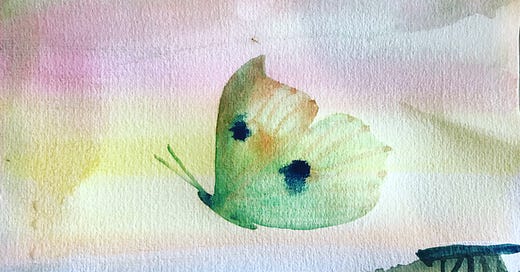A History of Kindness
David Foster Wallace is an American writer I stumbled across when searching for books with the word ‘water’ in the title. While listening to the short audiobook of his 2005 commencement address in Kenyon College, the bloom of an idea forms in my mind.
Part of the theme of his address is: in the routine, the boredom, and the strung-out-rush-drudgery of everyday life, if we are kind and present in those moments, well, there is the quiet revolution. This is Mary Oliver’s ‘dark bread of the poem.’
So I looked him up, and found, with immense sadness, that he died the following year. Suicide. Auē. Auē. Auē.
We can’t know the grief and torment of another.
I stumble with the idea I had while listening to his speech.
I think of my own grief, the deep water I’m learning slowly to paint. Feeling the pain. I lie in bed that night, sick with covid and not taking the next-due paracetamol to practise feeling the pain. At night I look for the constellation to the South West which sets above my cherry tree just before dawn. When it appears in my window, I watch the stars flicker in high winds and think how Māori could read weather patterns in the guttering light of stars. I deduce it will be windy, and sleep feeling somehow held by two stars above the bare branches of an untamed tree.
In the morning I decide to forget my idea. The star-wind has knocked the late blue delphiniums to the ground and blown the kayak paddle out of the shed. I look at them through the window on the ground and stay in bed. I’m knitting a bottle green jersey, which at any moment I may unravel. The shade of green I now associate with the roaring sore throat of covid as I knit, and already it’s too wide. Some projects need to be dropped, undone, let go so that others can fill the free space.
In a brief sojourn outside I leave the kayak paddle where it is, cut the delphiniums and bring them inside to clutter our strewn table. My whole household is sick, the kitchen is a shambles. We are out of bread. I eat three arrowroot biscuits, drink two cups of tea. I can hear my pulse whooshing behind my ears. I take paracetamol, knit two more green rows. Sleep.
I wake to a subtle shift in the air. I don’t know what it is. The wind continues the steady southerly the stars foretold. Late sun is gold on the shed. I check my phone. There’s a message from our friend Gareth:
“Hi kirstie. I made some
bread for you and will
leave it outside your
door. Let me know if
your fam is gluten free
though cos it won’t be
much use! Do you need
anything from town?
Hope everything ok.”
The bread is in the type of big cake tin my Nana used to fill. There’s a pattern of stylised ferns on the top. The loaf is wrapped in a heavy tea towel and is very faintly warm; it’s round, high and springy.
I say a prayer of thanks. A karakia for this bread. I cut it with a kind of reverent awe and immediately make three tuna, alfalfa and cheese sandwiches and deliver them to the ailing members of our small family unit.
I pick up my idea, put it in a vase. This is the thing David Foster Wallace meant. Gareth I know is recovering from a serious injury, he has two children to pick up from town. Yet he did this kind thing in the rush, in the pressure of the day to day. There won’t be a book launch or a newspaper article in the Otago Daily Times about this. These small moments don’t get recorded for history.
Except that, my idea is to write a new Substack called: A History of Kindness.
Notes on Māori words:
Auē: an expression of grief. I like to use it because it gives shape and sound to the tear in the heart.
karakia: a ritual blessing.
A History of Kindness is:
A place where once a month I share a story — a kind act, which has a deep ripple effect flowing out to me and others. These posts are for a community of people interested in: attention to, and connection with nature; creativity as space to grow hearts and minds; caring for each other, our oceans, skies and the earth under our feet.
Posts will be once a month on Tuesday. Free subscribers will get my History of Kindness newsletter, each post will be accompanied by one of my watercolour butterflies. Sometimes there will be poems.





Dear Kirstie, your substack is an act of kindness in itself. I love your idea. I love that you place it in
contexts of pain, of woundedness, of reaching out from that place to comfort and nourish someone else. The miracle of warm bread on your doorstep. Beautiful. Kind. Kin. Gathering in. Thank you.
On a good day, the world is a warm loaf of bread. Lovely words and watercolour, Kirstie.